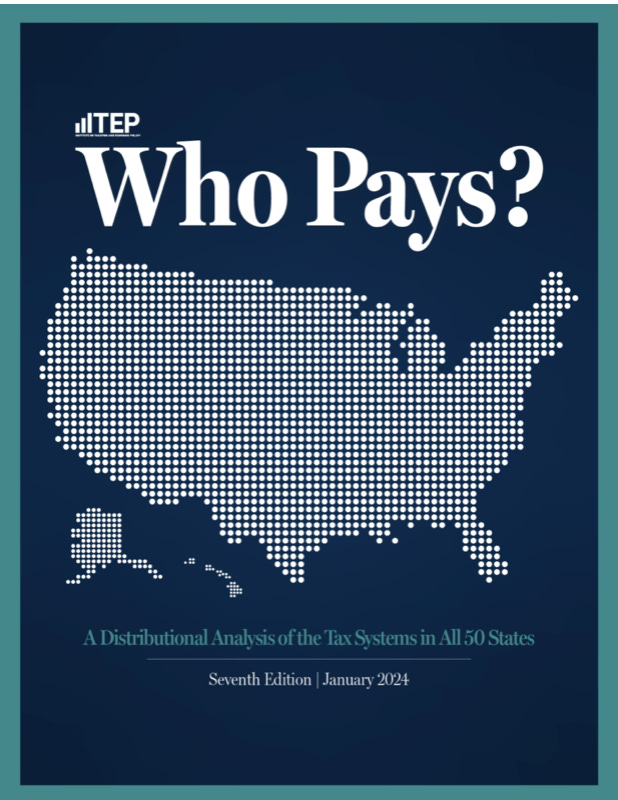Florida has the most unfair tax code in the country. But maybe that could change?
A news roundup from the first week of the Florida Legislature's 2024 session, including an idea that has predatory property insurers terrified. Plus: Top stories, notable quotes and bills on the move.

This is Seeking Rents, a newsletter and podcast devoted to producing original journalism — and lifting up the journalism of others — that examines the many ways that businesses influence public policy across Florida, written by Jason Garcia. Seeking Rents is free to all. But please consider a voluntary paid subscription, if you can afford one, to help support our work.
Florida politicians love to boast that Florida is a low-tax state. And it is — but only for the rich.
Consider the tax rates on Florida families in three income brackets, which come from a nationwide study published this week by the Institute on Taxation and Economic Policy:
Families earning less than $19,600 a year — which puts them in the bottom 20 percent of households in Florida — pay an average of 13.2 percent of their income in state and local taxes, when you add up all the different taxes that Florida charges. That’s what’s known as their “effective tax rate” — and it’s the seventh-highest effective tax rate on low-income families in the entire country, according to ITEP’s analysis.
Families earning between $35,700 and $61,500 a year — that’s the middle 20 percent in Florida — pay an effective state tax rate of 9.5 percent. That’s pretty much middle of the pack: Florida ranks No. 37, if you sort the states by highest tax rate on middle-income households, or No. 13, if you rank them by lowest effective rate.
Families earning more than $735,700 a year — the top 1 percent — pay an effective state tax rate of just 2.7 percent. That’s the second lowest tax rate on the top 1 percent in the country, behind only South Dakota.
To say this a different way: The state of Florida taxes low-income families nearly five times as much as it does the top 1 percent of families. And it taxes middle-income families more than three times as much as it does the top 1 percent.
Put it all together and it works out to the most regressive state tax code in the country, according to ITEP’s analysis.
ITEP has been doing distributional analyses of state tax systems for more than 25 years now (the last one was published in 2018). Florida has been in the bottom three for tax fairness every time. But this is the first time Florida has ranked as the absolute worst in the nation.
There are a few reasons Florida’s tax system is so easy on the rich but punishing on the poor.
Some of those reasons are old. For instance, the Florida Constitution blocks state taxes on personal income or inheritances — a pair of taxes that fall more heavily on higher-income taxpayers. That has helped make Florida the most dependent state in the nation on sales tax — a tax that falls more heavily on lower-income taxpayers.
What’s more, Florida only taxes a very narrow band of sales. Generally speaking, Florida taxes the sale of physical goods but not the sale of services. And people at the top of the economic pyramid spend a lot more on services than those at the bottom.
The state constitution also sets some strict limits on property taxes, particularly those paid by homeowners. And while the biggest of those limits — the Save Our Homes annual tax cap — is very popular with voters, tax data show that it overwhelmingly benefits owners of the most expensive properties, like the tycoons and celebrities who live along “Billionaires Row” in Palm Beach.
But Florida’s tax system has become even more regressive in recent years, as state leaders have made it a strategic priority to slash taxes paid by rich people and businesses.
For instance, after former Republican Gov. Jeb Bush was elected in 1998, one of the very first bills he signed cut a tax on stocks and bonds that was paid primarily by affluent investors. And the very last bill Bush signed before leaving the Governor’s Office eight years later eliminated that stocks-and-bonds tax entirely.
Meanwhile, former Republican Gov. Rick Scott focused much of his tax-cutting from 2011 to 2019 on lowering Florida’s corporate income tax and slashing taxes businesses pay when renting property or buying equipment.
And more recently, Republican Gov. Ron DeSantis orchestrated one of the largest tax shifts in state history — when he signed legislation that lifted more than $1 billion a year in taxes off of businesses and put it all on consumers instead.
It doesn’t have to be this way. There are some easy steps Florida could take to make its tax code fairer for working- and middle-class families.
For instance, Florida could enact what advocates call the “Working Floridians Tax Rebate” — a tax break that would save an average of $2,400 for more than 2 million lower-income households across the state.
Florida could also pass a policy known as “combined reporting” to close corporate tax loopholes that multinationals like Mastercard and Target are using to sidestep millions in state taxes every year. Most other states have already adopted combined reporting for corporate taxes.
In fact, a pair of Democratic lawmakers filed bills to create the Working Floridians tax break just before the Legislature gaveled open the 2024 session on Tuesday (Senate Bill 1570 and House Bill 1601).
We’ll find out soon whether the Legislature’s Republican leadership is willing to hear them.
The insurance industry’s worst nightmare
A couple of weeks ago, The Washington Post published an investigation into the way some property insurance companies are preying on hundreds of thousands of Florida homeowners — by pulling them out of the state’s public property insurance company and forcing them to pay far higher prices for private insurance instead.
The story featured the founder of one notorious insurer boasting about how his company can pluck money-making policies from state-run Citizens Property Insurance Corp., while leaving all the money-losing policies behind as the public’s problem.
“You get to cherry-pick the policies,” the founder of Tampa-based Slide Insurance said, according to The Post. “You are underwriting and cherry-picking the best policies, leaving kind of the worst ones there.”
Slide and other insurance companies can get away with this partly because of an industry-lobbied law that Gov. Ron DeSantis signed in December 2022 that leaves many Floridians with no choice but to give up their public insurance if a private company comes calling — even if that private insurance is far more expensive.
But now there’s a new idea on the table. Republican state Rep. Spencer Roach — who represents the part of the state that was destroyed by Hurricane Ian in September 2022 — has filed legislation (House Bill 1213) that would transform Citizens from a fishing pond for profiteering insurance executives into a true public option that could provide hurricane insurance to any Florida homeowner who wants it.
The longterm goal is to have the state of Florida provide all windstorm insurance itself, much like the federal government handles flood insurance. The rest of homeowner’s insurance — the more predictable parts of a policy, like fire and theft — would be left to the private sector.
“Rates will drop like a stone,” Roach said.
It will perhaps not surprise you to learn that Slide Insurance and other “insurance insiders” detest this idea.
Quotes from the Capitol
“There’s no iron law that says we have to have 67 counties…There’s no iron law that says we have to have 400-plus cities…Perhaps maybe we ought to look at consolidating counties, eliminating cities.”
— Rep. Wyman Duggan (R-Jacksonville), during a hearing Monday on legislation that would cut city and county property taxes.
“I want to be clear: I am not going to spend the next 60 days re-litigating Medicaid expansion…Medicaid expansion is not going to happen in Florida.”
— Senate President Kathleen Passidomo (R-Naples), during an opening-day speech on Tuesday in which she declared that Florida will remain one of just 10 states in the country that refuse to extend Medicaid health insurance to more low- and middle-income people.
“I think it’s something we have to consider…That’s a conversation we can have.”
— House Speaker Paul Renner (R-Palm Coast), during a meeting with reporters on Tuesday, in which he said his chamber may hold a hearing to legislation to create a public option for hurricane insurance.
“These are not children. These are 16- and 17-year-olds. They’re teenagers.”
— Rep. Linda Chaney (R-St. Pete Beach), while presenting a bill Wednesday that would weaken the state’s child-labor laws.
“So, if my neighbor leaves out a lot of garbage, and bears are coming to that area, and then my kids are playing in the yard, and a bear is coming after my kids — are you okay with me defending my kids?”
— Sen. Jonathan Martin (R-Fort Myers), while discussing a bill Wednesday that would allow people to shoot Florida black bears if they feel threatened.
“Could wages go down? Maybe. It’s up to the prerogative of the employer."
— Rep. Tiffany Esposito (R-Fort Myers), while presenting a bill Thursday that would erase living wage ordinances in places like Miami, St. Petersburg and Gainesville.
Billtrack
In homage to Capitol Update, here’s a look at some of the bills on the move this week:
House Bill 49: The bill would allow businesses to make some high-schools students work 40-hour weeks during the school year and allow teenagers to drop out and become full-time workers the moment they turn 16. Passed the House Local Administration, Federal Affairs & Special Districts Subcommittee by a 12-5 vote. (Vote sheet)
House Bill 433: The bill would stop local governments from requiring businesses to pay living wages, provide minimum levels of benefits, or ensure access to drinking water for employees working outdoors in extreme heat. Passed the House Regulatory Reform & Economic Development Subcommittee by a 9-4 vote. (Vote sheet)
Senate Bill 480: The bill would help power companies make their customers foot the bill for investments in biomethane — gas extracted from sources like cow manure and garbage. Passed the Senate Regulated Industries Committee by a 7-0 vote. (Vote sheet)
House Bill 549: The bill would impose long prison sentences on shoplifters. Passed the House Criminal Justice Subcommittee by a 15-3 vote. (Vote sheet)
House Bill 601: The bill would abolish local civilian review boards that provide outside oversight of police departments and make it harder for cities and counties to investigate claims of brutality by police officers. Passed the House Criminal Justice Subcommittee by a 14-3 vote. (Vote sheet)
Senate Bill 632: The bill would allow people to shoot black bears if they feel threatened by the animals. “Stand Your Ground” but for bears. Passed the Senate Environment and Natural Resources Committee by a 5-2 vote. (Vote sheet)
Senate Bill 738: The bill would make it harder for environmental groups to sue state agencies that fail to enforce environmental laws, by exposing the groups to harsher financial penalties if they lose their suit. Passed the Senate Environment and Natural Resources Committee by a 5-2 vote. (Vote sheet)
Reading list
Floodlight and Capital B: ‘What Corruption Gets You’: How Utility Companies Bought Support in the Black South
Tampa Bay Times: Legislature’s report on Florida insurance lawsuits is mixed
Sarasota Herald-Tribune: New College of Florida launches online degree program in collaboration with billionaire
Orlando Weekly: Florida Republican cuts public comment on bill that could affect wages of thousands of workers
Palm Beach Post: Fearing penalties, some Florida school districts are pulling hundreds of books
South Florida Sun-Sentinel: Republican bill would ban nearly all abortions in Florida
Orlando Sentinel: Florida Senate bill would protect Visit Orlando’s $100-million budget
Tampa Bay Times: Here are the environmental bills to watch as Florida’s legislative session starts
Tampa Bay Times: Florida attorney general floated idea to give office more power over drug cases
New York Times: Appeals Court Finds DeSantis Violated Prosecutor’s First Amendment Rights
Orlando Sentinel: The great grift: Orlando Magic make millions off naming rights to arena taxpayers built | Commentary







Florida holds the bragging rights for being the most egregious neofascist network in this country. Governor speaks and his soldiers enforce. I’m certain it’s setting the bar for every other red state legislature. By the time this session ends The People won’t know what hit them, which is exactly their intent. Maim them swiftly before they have a chance to react.
It’s the model followed by bullies and other cowards.
OH MY GOD, Another frightening recap of the Republican power grab. I'm only sorry that more people aren't subscribed to this. I cringe to what the Republicans are doing. This must get to the air waves because the more these voters fall silent the worse it becomes. Jason, great idea to provide the link for the votes on committees. Can we perhaps get a "D" or "R" next to the persons name to quickly see what party is voting....which way? The Republicans are only in it for their donor base.
GOP=Party of Grifters.